mortgage delinquencies
Mortgage Delinquencies Introduction
Have you been keeping up with your bills lately? You might have spotted a troubling trend in financial news. More and more Ontario homeowners are trying to keep up with their mortgage payments. Last quarter alone, over 11,000 mortgage delinquencies were recorded—nearly triple what we saw back in 2022!
I’ve been watching this situation unfold with growing concern. Homeownership has long been considered a cornerstone of financial stability, but that foundation seems increasingly shaky for many families.
In this Brandon’s Blog post, I’m digging into Ontario’s current mortgage crisis to uncover what’s behind these alarming numbers and share some insights that might help if you’re feeling the pinch.
Current State of Mortgage Delinquencies in Ontario
The numbers don’t lie, and they’re pretty sobering. Over 11,000 mortgage delinquencies in just one quarter (Q4 2024) represent almost three times what we saw in 2022. I was shocked when I first came across these statistics.
Overview of Statistics and Trends
To put this in perspective, we’re looking at a 50% increase in delinquencies compared to pre-pandemic levels. For homeowners, this signals potentially rough waters ahead. From what I’ve gathered, the primary culprits behind this crisis are the rapid rise in interest rates combined with the sky-high home prices we saw during the pandemic.
- 11,000 mortgages overdue in Q4 2024
- 50% jump from pre-pandemic levels
The Bigger Picture
Equifax Canada recently reported a significant uptick in missed payments. But these aren’t just abstract numbers—they represent real families facing financial hardship. Rebecca Oakes, VP of Advanced Analytics at Equifax, put it well when she said:
“The rise in missed payments indicates deeper financial strains among consumers.”
Her words hit home for me. I’ve spoken with several homeowners who bought during the pandemic using variable interest rate mortgages. Many told me they expected rates might rise eventually, but nobody anticipated how quickly they’d shoot up. The result? Most of their monthly payments now go toward interest, with barely anything chipping away at the principal. These families have had to slash their spending and implement strict budgeting just to stay afloat.
The Ripple Effect
Ontario has seen a particularly troubling 90% increase in homeowners falling behind on mortgage payments by 90 days or more—outpacing similar trends in Quebec and British Columbia. Mortgage delinquencies reflect broader economic challenges affecting many households.
For example, the 90-plus day non-mortgage delinquency rate in Ontario jumped by 46.1%. This surge in payment struggles points to a larger issue with non-mortgage debts as well. Consumer debt in Canada has now reached an eye-watering $2.56 trillion, up 4.6% from 2023. That’s an enormous burden for families to carry.
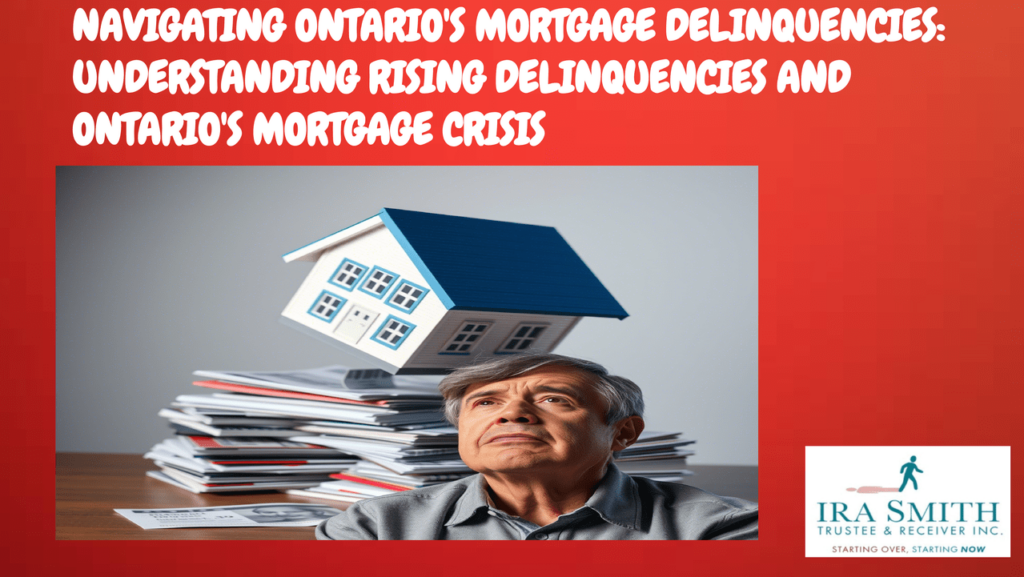
Mortgage Delinquencies: What Lies Ahead?
Looking forward, I’m particularly concerned about the wave of mortgage renewals on the horizon. Over 1 million fixed-rate mortgages will come up for renewal in 2025. Many of these were secured when the Bank of Canada’s overnight rate was below 1%—now it stands at 3%. Based on my research, about a quarter of homeowners expect their monthly payments to increase by at least $150 when they renew. Can you imagine suddenly having to find an extra $150+ every month in an already tight budget?
With economic uncertainties looming, understanding your mortgage options becomes crucial. If you’re struggling, please don’t suffer in silence. Financial advice, deferral programs, or support from family and lenders can make a significant difference. In these challenging times, thoughtful financial planning is more important than ever.
As market conditions shift, I expect many distressed homeowners will soon be looking to sell. It’s a tough reality, but awareness and preparation can help navigate these turbulent waters.
Mortgage Delinquencies: Understanding Mortgage Delinquency vs. Default
Definitions and Key Differences
Throughout my years working with homeowners, I’ve noticed considerable confusion between mortgage delinquencies and defaults. Though related, they represent different stages of payment issues with distinct implications.
Mortgage Delinquency happens when you miss a scheduled payment or can’t make the full amount by the due date. Most mortgage agreements include a grace period—typically about 15 days—during which you can still make the payment without being considered delinquent. Once this grace period expires without payment, your mortgage enters delinquency status.
Delinquency is measured in days (30, 60, and 90 days delinquent) and represents the earliest stage of payment problems. It’s an early warning sign but is relatively common and often temporary. I’ve seen many homeowners experience short-term delinquency due to unexpected expenses, simple administrative errors, or temporary income disruptions.
Mortgage Default is more serious and occurs when you’ve failed to comply with your mortgage agreement terms for an extended period. In Canada, a mortgage is typically considered in default when payments are 90+ days past due, though this can vary by lender and province.
Default signals a fundamental breakdown in your ability or willingness to meet mortgage obligations. While delinquency can often be resolved with catch-up payments, default usually requires more significant intervention such as loan modification, forbearance, or in severe cases, power of sale proceedings.
The progression from delinquency to default isn’t automatic—many delinquent mortgages never reach default status as homeowners recover financially or make arrangements with their lenders.
Legal Implications of Both Terms
The legal consequences differ significantly between delinquency and default, with much more severe ramifications once a mortgage enters default status. In Ontario, the Mortgages Act governs.
Legal Implications of Delinquency:
- Credit Reporting: Mortgage delinquencies typically hit your credit bureau once a payment is 30 days late, damaging your credit score. This impact grows the longer the delinquency continues.
- Late Fees: Lenders can charge late fees as outlined in your mortgage agreement, usually a percentage of the overdue payment or a flat fee.
- Collection Activities: Expect contact from your lender through phone calls, emails, and formal notices as they try to resolve the situation.
- Notice of Arrears: In Ontario, lenders may send a formal Notice of Arrears once you miss a payment, documenting the delinquency.
Legal Implications of Default:
- Notice of Default: Once in default, your lender can issue a formal Notice of Default or issue a Notice of Sale Under Mortgage — the first step toward potential sale or foreclosure.
- Power of Sale Proceedings: Ontario residential mortgages include Power of Sale provisions. After the time indicated in the mortgage, which can be as little as 15 days after default in making any payment provided for by the mortgage, lenders initiate these proceedings. They then must allow the 45-day statutory redemption period to expire before taking any other action.
- Acceleration Clause: Upon default, lenders can trigger the acceleration clause in your mortgage agreement, making the entire mortgage balance due immediately rather than just the missed payments.
- Property Seizure: Default can ultimately lead to the lender taking possession of your property through foreclosure or selling it through Power of Sale proceedings.
- Deficiency Judgments: If selling your property doesn’t cover the outstanding mortgage balance (including additional default interest, fees and costs), the lender may pursue a deficiency judgment against you for the remaining amount.
- Legal Fees: As a defaulting borrower, you’re typically responsible for all legal fees and costs associated with default proceedings, which can substantially increase your debt.
- Long-term Credit Implications: Mortgage default can haunt your credit report for up to 7 years in Canada, severely limiting future borrowing opportunities.
If you’re facing potential delinquency or default, I strongly recommend early consultation with your lawyer and even with a Licensed Insolvency Trustee. Although an insolvency process normally does not deal with secured creditors like a mortgagee, it may be that your financial problems also stretch to unsecured creditor problems, like credit card debt. The Licensed Insolvency Trustee can guide you through options like consumer proposals or other debt relief measures that might help avoid the worst consequences. Eliminating your unsecured debt could be the answer to saving your home.

Factors Contributing to Mortgage Delinquencies
Increasing Consumer Debt Levels
From what I’ve seen firsthand, Ontario homeowners are under unprecedented pressure as consumer debt continues to climb. Recent Statistics Canada data shows that the average debt-to-income ratio for Ontario households has reached concerning levels. Many homeowners I’ve spoken with are juggling multiple debts alongside their mortgages—credit cards, car loans, lines of credit, you name it.
This debt stacking creates a precarious situation where even minor income disruptions can trigger a cascade of payment problems. When you’re already allocating a significant chunk of your income to various debts, mortgage payments—typically the largest financial obligation—become increasingly difficult to manage.
I’ve also noticed that the recent proliferation of “buy now, pay later” services and easily accessible credit has further complicated matters. Many homeowners find themselves servicing high-interest short-term debts, diverting funds that would otherwise go toward their mortgage.
Post-pandemic Underwriting Practices
The COVID-19 pandemic created unique conditions in the mortgage market that are now contributing to rising delinquency rates. During the pandemic, many lenders adopted more flexible underwriting standards as interest rates hit historic lows and property values soared.
These pandemic-era mortgages were often approved based on temporarily inflated property valuations and artificially low interest rates. Now that the market is normalizing, homeowners who purchased at the peak face the dual challenge of potentially underwater mortgages and less favourable refinancing options.
Additionally, income verification procedures are sometimes relaxed during the pandemic, particularly for self-employed borrowers or those with non-traditional income sources. Some homeowners were approved for mortgage amounts that, in retrospect, exceeded their sustainable debt capacity.
The aftermath of these lending practices is becoming evident as more homeowners struggle with payment obligations that seemed manageable under different economic conditions.
Rising Costs of Variable-Rate Mortgages
Perhaps the most significant factor driving mortgage delinquencies in Ontario has been the dramatic impact of interest rate increases on variable-rate mortgages. Many homeowners who opted for variable-rate products during the low-interest environment now face substantially higher monthly payments.
To put this in perspective, I recently worked with a family with a $500,000 variable-rate mortgage who secured their loan when rates were near historic lows. They’ve seen their monthly payments jump by nearly $700 as rates climbed. This kind of payment shock has devastated household budgets already stretched thin by inflation in other essential spending categories.
The situation is particularly challenging for first-time homebuyers who entered the market with minimal down payments and maximum amortization periods. These borrowers typically have less equity cushion and fewer options for refinancing or restructuring their debt.
As the trigger rate phenomenon continues to affect variable-rate mortgage holders, many borrowers are discovering that their payments are covering only interest, with no principal reduction occurring. This realization often leads to financial distress and, ultimately, mortgage delinquency if intervention measures aren’t taken promptly.
Mortgage Delinquencies: The Impact of Economic Conditions on Mortgages
Effects of Inflation on Consumer Behaviour
Inflation has emerged as a critical factor influencing mortgage outcomes across Ontario. I’ve watched as the persistent rising inflation rates over the past two years have fundamentally altered how homeowners prioritize spending and manage mortgage obligations.
When inflation drives up the cost of necessities like food, utilities, and transportation, homeowners face difficult financial trade-offs. Many families I’ve counselled find themselves allocating an increasingly larger portion of their income to basic needs, leaving less for mortgage payments. This reprioritization of expenses often happens gradually, with homeowners first cutting discretionary spending before falling behind on secured debt payments.
The “payment hierarchy” theory suggests that consumers typically prioritize payments in order of immediate necessity and consequences. Historically, mortgage payments ranked high in this hierarchy due to the fundamental importance of housing security. However, when inflation significantly impacts essential expenses, I’ve seen this hierarchy shift, with some homeowners choosing to meet immediate needs over making their full mortgage payment.
Bank of Canada statistics indicate that households facing inflation pressures without corresponding income growth are approximately 30% more likely to experience mortgage delinquency. This relationship becomes particularly pronounced when inflation outpaces wage growth for consecutive quarters, as we’ve seen in many regions of Ontario.
Another inflation impact I’ve observed is the reduction in financial buffers. Many Ontario homeowners who previously maintained emergency savings have depleted these reserves due to higher everyday costs, leaving them more vulnerable when unexpected expenses arise. Financial advisors typically recommend keeping 3-6 months of expenses in emergency funds, but recent surveys show over 40% of Ontario mortgagors have less than one month of payment reserves available.
Employment Trends and Mortgage Payments
The stability of employment remains perhaps the single most reliable predictor of mortgage payment performance. Ontario’s employment landscape has undergone significant structural shifts that directly impact homeowners’ ability to maintain mortgage payments.
Recent employment data reveals several concerning trends I’ve been tracking:
The growth of precarious employment, including contract, gig, and part-time positions, has created income volatility for many Ontario homeowners. Unlike previous generations who could rely on stable, long-term employment with predictable income, today’s workforce often experiences periods of fluctuation. This irregularity makes consistent mortgage payments challenging, particularly for households that secured mortgages based on income projections that assumed greater stability.
Sectoral shifts in employment have also contributed to mortgage stress. Industries that once provided reliable middle-income employment have contracted, while growth has concentrated in either high-skill positions requiring specialized education or lower-wage service sector jobs. Homeowners caught in these transitions often face income reductions that directly impact affordability calculations based on previous earning levels.
Geographic employment disparities within Ontario further complicate the mortgage landscape. While certain urban centers continue to experience employment growth, several regions face persistently higher unemployment rates. These regional economic differences create “hot spots” of mortgage delinquency in communities where employment opportunities have diminished. Data from the Canada Mortgage and Housing Corporation (CMHC) indicates that areas with unemployment rates exceeding the provincial average by 2% or more typically experience mortgage delinquency rates 40-50% higher than the provincial norm.
The emergence of remote work initially provided flexibility for many households but has since created new vulnerabilities. As companies adjust their remote work policies, some homeowners who relocated to more affordable areas based on remote work assumptions now face difficult commuting situations or potential job transitions, both of which can disrupt income stability and mortgage payment consistency.
For homeowners experiencing employment disruptions, I’ve found that the timing of intervention is crucial. Statistics show that homeowners who contact their lenders within 30 days of employment changes are significantly more likely to secure workable payment arrangements than those who wait until they’ve already missed payments. This highlights the importance of proactive communication between mortgagors and lenders when employment circumstances change.

Mortgage Delinquencies: Implications For Homeowners
I recently spoke with Pushkar, a software engineer living in British Columbia. Like many others, he’s feeling the weight of rising interest rates. In August 2022, Pushkar purchased his townhouse with a variable interest rate of 4.8%. At that time, he thought he was making a smart move. But as rates climbed, he quickly realized the reality was far different.
The Financial Strain
By 2023, Pushkar’s situation had changed dramatically. Most of his monthly payments were going toward interest. Only $400 was applied to the principal of his $950,000 mortgage. I remember how stressed he looked when telling me this—watching his hard-earned money disappear into interest payments while barely making a dent in his actual loan balance.
To cope with these rising costs, Pushkar and his family made serious adjustments. They implemented strict budgeting, cutting their spending by $800 each month. This wasn’t just a minor tweak—it was a complete overhaul of their financial lifestyle. They had to prioritize needs over wants, making tough decisions daily about what they could afford.
Emotional Toll
Stories like Pushkar’s highlight the emotional and financial toll of rising costs. It’s not just about numbers on a page. During our conversation, Pushkar confessed to experiencing anxiety and stress that was affecting his sleep and family relationships. The pressure of financial strain can feel isolating, but as I assured him, he’s far from alone in this struggle.
Wider Implications
Pushkar’s experience reflects a broader crisis affecting many homeowners. According to reports I’ve been following, mortgage delinquencies in Ontario have surged dramatically. Over 11,000 mortgages failed to meet at least one payment in the fourth quarter of 2024—nearly three times the amount recorded in 2022.
Rebecca Oakes, Vice President of Advanced Analytics at Equifax, notes that rising home prices and escalating interest rates are significant contributors to this crisis. As more homeowners face financial strain, the emotional burden continues to grow, creating a cycle that can feel unending for those caught in it.
What Can Be Done?
If you’re navigating these challenging times, consider your options. Based on my experience working with homeowners in similar situations, adjusting your budget is a critical first step. Can you identify areas to trim expenses? Are there ways to increase income?
Don’t hesitate to reach out for help. Seeking financial advice, utilizing deferral programs, or even talking to family and lenders might provide some relief. I’ve seen how staying informed and proactive can make all the difference.
Pushkar’s story serves as a reminder of the challenges many face today. While we can’t change the economic landscape overnight, supporting each other through these tough times can make a significant difference. Every story matters—your experience contributes to a larger narrative about resilience and hope in the face of adversity.
Mortgage Delinquencies: Impending Mortgage Renewals Are A Looming Financial Challenge
Are you facing a mortgage renewal soon? You’re not alone. I’ve been tracking the numbers, and over 1 million mortgages are expected to renew in 2025. Many of these were taken out when interest rates were below 1%. Now, as rates continue to rise, the financial landscape is shifting dramatically for many Ontario families.
The Reality of Rising Payments
Last month, I met with a couple who had been comfortably paying their mortgage for years. When we calculated their potential new payment at renewal, they were shocked to discover they’d face a $325 monthly increase. For them, this wasn’t just a minor adjustment but a significant hit to their household budget.
This scenario is playing out across Ontario:
- Over 1 million mortgages due for renewal in 2025
- About 25% of homeowners anticipate at least a $150 monthly increase
- Some will face increases of $300-500 or more
- Economic uncertainty complicates renewal planning
With the Bank of Canada’s overnight rate now at 3%, the days of ultra-low interest rates seem like a distant memory. For homeowners who secured their mortgages when rates were at historic lows, this change can feel overwhelming. I’ve seen firsthand how essential it is to prepare for the financial implications that come with these adjustments.
Understanding Your Mortgage Terms
As fixed-rate terms approach their end, understanding your renewal options becomes critical. I’ve found that many homeowners don’t fully grasp how their mortgage terms work until they’re facing renewal. The increase in payments will likely compound existing financial strain, especially since many people are already feeling squeezed by rising costs in other areas of their lives.
Rebecca Oakes, VP of Advanced Analytics at Equifax, highlights that the rise in missed mortgage payments indicates deeper financial strains among consumers. The pandemic drove home prices to soar, and now, escalating interest rates are adding to the burden. This situation isn’t just about numbers—it’s about real families making tough choices at kitchen tables across the province.
The Bigger Picture
Remember Pushkar’s story I shared earlier? His experience with variable rates offers a preview of what many fixed-rate mortgage holders will soon face. He had to cut spending by $800 monthly just to manage his payments. This serves as a stark reminder of the financial adjustments many will need to make when their mortgages renew at higher rates.
As I’ve been monitoring these trends, I’m particularly concerned about the troubling rise in mortgage delinquencies. Ontario has seen a 90% increase in homeowners falling behind on payments by 90 days or more. This situation reflects broader economic struggles that could affect many homeowners facing renewal in the coming year.
What Can You Do?
If you’re feeling overwhelmed by an upcoming renewal, you’re not alone. From my experience working with homeowners in similar situations, I strongly recommend seeking assistance before the situation deteriorates. Consider reaching out for financial advice from professionals who understand the current mortgage landscape.
I’ve seen how utilizing deferral programs or getting help from family and lenders can provide the necessary support to manage escalating costs. Understanding your mortgage options and planning your financial future is vital during this uncertain time.
As you prepare for your mortgage renewal, remember that being proactive can make all the difference. Start planning now, even if your renewal is months away. The landscape is changing rapidly, and the sooner you prepare, the better positioned you’ll be to face the challenges ahead.

Mortgage Delinquencies: Managing Financial Strain Amid Rising Rates
In my years helping homeowners navigate financial challenges, I’ve seen how rising mortgage rates can squeeze even the most carefully planned budgets. While the situation may seem overwhelming, I’ve found there are practical strategies that can help manage this strain effectively.
Budgeting has proven to be the most powerful tool in my financial toolkit. When working with clients, I always start by helping them track where their money goes. You might be surprised at what you discover when you look closely at your spending patterns. Here’s the approach I recommend:
- List Your Income: Write down everything coming in, including side gigs or occasional earnings.
- Track Your Expenses: For at least two weeks, record every dollar you spend. Those coffee runs and subscription services add up faster than you think!
- Identify Needs vs. Wants: This is often the hardest part. I had one client who saved $300 monthly just by honestly separating essential expenses from nice-to-haves.
- Set a Budget: Create realistic spending targets for each category and stick to them. I’ve found that using cash for certain categories helps many people stay on track.
Beyond budgeting, I’ve seen tremendous value in professional financial advice. A good financial advisor can spot opportunities you might miss and provide tailored guidance based on your unique situation. One of my clients discovered they qualified for a tax credit they hadn’t been claiming, putting an extra $2,200 back in their pocket annually.
For immediate relief, don’t overlook deferral programs. Many lenders offer temporary payment adjustments when you’re experiencing short-term financial difficulties. I recently helped a family secure a three-month partial deferral that gave them breathing room to get back on their feet after a medical emergency.
Don’t Hesitate to Seek Help
Pride can be expensive. I’ve seen too many people damage their financial futures by waiting too long to ask for help. Family and friends can be invaluable resources—not just for possible financial assistance but also for emotional support and practical advice. Sometimes, just talking through your situation can reveal solutions you hadn’t considered.
I always emphasize the importance of contacting your lender proactively. In my experience, lenders are far more willing to work with borrowers who approach them before missing payments. Many have hardship programs that aren’t widely advertised but can be accessed if you ask.
Stay Informed About Mortgage Options
With so many fixed-rate mortgages coming up for renewal soon, understanding what to expect is crucial. I’ve been helping clients explore alternatives like extending amortization periods to lower monthly payments or considering a blend-and-extend option if that makes sense for their situation.
As one financial expert, I work with often says,
“Navigating these times requires proactive measures to maintain financial health.”
This couldn’t be more true—waiting until you’re in crisis mode limits your options significantly.
Empower Yourself with Knowledge
I’m a firm believer that financial education is key to weathering economic challenges. When I teach financial literacy workshops, I see how empowering it is when people truly understand their mortgage terms, interest calculations, and available options.
Take some time to learn about financial strategies and mortgage alternatives. Knowledge truly is power when it comes to your financial well-being. I’ve seen how even a basic understanding of financial concepts helps people make better decisions and feel more in control during uncertain times.
In conclusion, managing financial strain amid rising rates isn’t impossible. By implementing thoughtful budgeting strategies, seeking help when needed, staying informed about your options, and investing in your financial education, you can navigate these challenging times. Remember, proactive measures today can prevent major problems tomorrow.
7 Steps for Canadians Facing Mortgage Payment Difficulties or Mortgage Delinquencies
Over the years, I’ve worked with countless homeowners struggling to keep up with their mortgage payments. If you’re finding it hard to make ends meet, here are seven critical steps I recommend taking before the situation worsens:
1. Contact Your Lender Immediately
This is the step most people avoid, but it’s the most important one. In my experience, lenders are far more willing to work with you when you reach out before missing payments. Last year, I helped a client negotiate a short-term payment reduction after she proactively contacted her bank about an upcoming job transition.
Most Canadian financial institutions offer various hardship programs that might include:
- Short-term payment deferrals
- Extended amortization periods to lower monthly payments
- Interest-only payment arrangements
- Special repayment plans for catching up on missed payments
- Mortgage restructuring options
Early communication demonstrates good faith and gives you access to more options than if you wait until you’re already behind.
2. Seek Professional Financial Advice
The right professional guidance can make all the difference. Consider consulting:
- A Licensed Insolvency Trustee who can provide a comprehensive assessment of your entire financial situation and explain all your legal options
- A non-profit credit counsellor who can help create a budget and debt management plan
- A mortgage broker who might identify refinancing options you haven’t considered
I recently worked with a family who thought bankruptcy was their only option, but after consulting with us, they discovered a consumer proposal would allow them to keep their home while addressing their unsecured debt problems.
3. Explore Government Assistance Programs
Don’t overlook potential help from government programs. Several Canadian options may assist:
- The First-Time Home Buyer Incentive (if eligible)
- Provincial emergency housing benefit programs
- Tax credits or rebates you might not be claiming
- Employment Insurance if job loss is a factor
One client I worked with discovered they qualified for a provincial deferral program that freed up $325 monthly in their budget—enough to help them manage their mortgage payment increase.
4. Consider Formal Debt Relief Options
If your financial situation is severe, you might need to explore more structured solutions:
- Consumer Proposal: A legally binding arrangement where you pay back a portion of your unsecured debt
- Bankruptcy: A last resort that provides debt relief but has significant impacts on credit
- Mortgage forbearance agreements through your lender
- Selling your home to use the equity for a fresh start in a rental while paying down other debts
Each option has pros and cons that should be carefully weighed with professional guidance.
5. Evaluate Housing Alternatives
Sometimes the most practical solution involves making changes to your housing situation:
- Renting out a portion of your home to generate additional income
- Selling and downsizing to a more affordable property
- Considering a voluntary sale to avoid foreclosure proceedings
I’ve seen how renting out a basement apartment helped one family earn an extra $1,200 monthly—enough to bridge their payment gap and keep their home.
6. Protect Your Credit Where Possible
Even during financial hardship, try to minimize damage to your credit:
- Maintain communication with all creditors
- Get payment arrangements in writing
- Keep detailed records of all communications
- Regularly monitor your credit report for accuracy
Taking these steps can make rebuilding your financial health easier once you’ve weathered the current storm.
7. Create a Strict Budget and Spending Plan
Develop what I call a “crisis budget” that:
- Prioritizes secured debts like your mortgage
- Eliminates all non-essential spending
- Redirects available funds to housing costs
- Identifies additional income opportunities
One family I worked with found an additional $475 monthly just by implementing a strict temporary budget—enough to keep them in their home while they addressed their broader financial challenges.
The most important takeaway is that proactive action significantly improves outcomes. Many Canadians successfully navigate mortgage difficulties with the right support and information. Don’t wait until you’re already behind—the sooner you take action, the more options you’ll have.

Mortgage Delinquencies: Insights for Financial Institutions
Risk Assessment and Management Strategies
Throughout my career working with both borrowers and lenders, I’ve observed that financial institutions in Ontario face increasing challenges in managing mortgage portfolios amid evolving economic conditions. Traditional risk assessment models that serve well in stable environments are proving insufficient in today’s landscape, necessitating more sophisticated approaches.
Forward-looking risk management requires lenders to implement early warning systems that detect subtle indicators of potential mortgage distress. These indicators often precede actual payment delinquency and may include:
- Patterns of decreasing savings account balances
- Increased utilization of revolving credit lines
- Changes in transaction patterns showing greater reliance on credit for everyday expenses
- Irregular payment timing even when full payments are eventually made
- Increases in NSF incidents across banking products
The most progressive institutions I’ve worked with are incorporating these behavioural metrics into dynamic risk-scoring models that supplement traditional credit bureau data. This approach allows for more proactive intervention before a mortgage enters formal delinquency status.
Portfolio stress testing has also evolved considerably. Rather than applying uniform interest rate shocks across all mortgages, sophisticated lenders now conduct segmented stress tests that consider regional economic variations, employment sector vulnerabilities, and debt-to-income ratios specific to customer segments. This granular approach enables more targeted risk mitigation strategies.
The variable-rate mortgage segment requires particular attention in the current environment. I’ve helped financial institutions develop specialized monitoring protocols for variable-rate mortgages approaching their trigger rates. Identifying these high-risk scenarios and initiating contact with affected borrowers before payment disruptions occur can significantly reduce default rates.
For mortgages already showing signs of stress, a graduated response framework that includes multiple intervention options beyond the binary choices of foreclosure or maintaining the status quo has proven most effective. These might include:
- Term extensions to reduce monthly payment obligations
- Interest rate modifications for temporary hardship cases
- Principal forbearance options with catch-up provisions
- Targeted refinancing programs for qualified borrowers
Institutions that develop comprehensive, flexible approaches to mortgage distress will not only minimize losses but also maintain stronger customer relationships through difficult economic cycles.
Importance of Customer Outreach and Support
Proactive customer engagement has emerged as a critical factor in managing mortgage delinquency. My research and experience consistently demonstrate that early, empathetic communication with borrowers facing financial challenges significantly improves outcomes for both customers and financial institutions.
Effective customer outreach programs should be initiated before formal delinquency occurs. Data analytics can identify customers exhibiting early warning signs of financial stress, allowing institutions to initiate supportive communication framed as financial wellness check-ins rather than collections activities. This approach reduces the stigma associated with financial difficulty and increases customer receptivity.
Financial literacy support represents another valuable intervention strategy. Many borrowers experiencing payment challenges benefit from education regarding:
- Budgeting techniques during inflationary periods
- Strategies to prioritize debts effectively
- Available government assistance programs
- Options for mortgage modification
- Long-term consequences of various financial decisions
Institutions that provide these educational resources demonstrate commitment to customer success while simultaneously improving repayment outcomes.
Communication channels and timing also significantly impact customer engagement effectiveness. Multi-channel approaches that combine traditional methods (letters, phone calls) with digital touchpoints (secure messaging, mobile app notifications, email) show higher response rates than single-channel strategies. Additionally, institutions should analyze customer behavioural data to identify optimal contact times that increase the likelihood of meaningful engagement.
When developing specialized support teams for mortgage assistance, training should emphasize both technical knowledge and emotional intelligence. Staff members who can explain complex financial concepts while demonstrating genuine empathy create more productive interactions with customers facing financial stress.
Financial institutions should also consider implementing dedicated mortgage modification specialists who can rapidly assess customer situations and offer appropriate solutions. These specialists require the authority to approve reasonable modifications without excessive approval layers that can delay assistance until a customer’s situation has deteriorated further.
The reputational benefits of effective customer support during financial hardship should not be underestimated. Institutions that demonstrate a genuine commitment to helping customers navigate difficult periods build lasting loyalty that extends beyond the mortgage relationship.
Frequently Asked Questions: Ontario’s Mortgage Crisis
What is the current state of mortgage delinquencies in Ontario?
Ontario is experiencing an alarming surge in mortgage delinquencies. As of Q4 2024, over 11,000 Ontario mortgages are delinquent (meaning at least one missed payment). This represents nearly triple the number recorded in 2022 and a 50% increase compared to pre-pandemic levels. Most concerning is the 90% increase in homeowners falling behind on mortgage payments by 90 days or more—a trend outpacing similar situations in Quebec and British Columbia.
What factors are driving the rise in Ontario mortgage delinquencies?
The current mortgage crisis in Ontario stems from several interconnected factors:
- Interest rate increases: The rapid rise in rates has dramatically increased monthly payments, particularly for variable-rate mortgage holders
- Pandemic-era purchasing decisions: High home prices during the pandemic, combined with more flexible underwriting standards, left many homeowners overextended
- Rising consumer debt burdens: Inflation has driven up costs for necessities, making it increasingly difficult for homeowners to prioritize mortgage payments
- Employment challenges: Shifting employment trends have further complicated homeowners’ ability to maintain consistent payments
- Cumulative inflation effects: Prolonged inflation has eroded household purchasing power, affecting overall financial stability
What’s the difference between mortgage delinquency and default in Ontario?
Mortgage Delinquency:
- Occurs when a payment is missed or not made in full by the due date
- Most Ontario lenders provide a grace period (typically 15 days) before officially marking a mortgage as delinquent
- Results in credit reporting damage, late fees, and preliminary collection activities
Mortgage Default:
- More serious condition occurring after prolonged non-compliance (typically 90+ days past due)
- Triggers a formal Notice of Default from the lender
- This can lead to power of sale proceedings where the lender sells the property
- This may result in the acceleration of the entire mortgage balance
- This can lead to property seizure and potential deficiency judgments if the sale doesn’t cover outstanding debt
- Causes significant long-term damage to credit scores and borrowing capacity
How will impending mortgage renewals affect Ontario homeowners?
Ontario faces a significant mortgage renewal challenge in 2025, with over 1 million mortgages due for renewal. Many of these were secured when interest rates were below 1%. With the Bank of Canada’s overnight rate now at 3%, homeowners face substantially higher monthly payments. Industry estimates suggest approximately 25% of Ontario homeowners will experience increases of at least $150 per month, with some facing $300-$500 or more in additional monthly costs.
What steps should Ontario homeowners take to prepare for mortgage renewal?
Homeowners approaching renewal should:
- Review their current mortgage terms and understand their options
- Seek professional financial advice from mortgage brokers or financial advisors familiar with Ontario’s market
- Explore deferral programs offered by their specific lender
- Consider family support options if available
- Adjust household budgets to accommodate potential payment increases
- Begin planning 6-12 months before renewal to maximize preparation time
- Compare rates across multiple lenders rather than automatically renewing with their current institution
What practical strategies can help manage financial strain amid rising mortgage rates?
Ontario homeowners facing financial pressure should consider:
- Comprehensive budgeting: Track all income and expenses, distinguish needs from wants, and set realistic spending targets tailored to current financial reality
- Professional financial consultation: Seek advice from Ontario-based financial advisors who understand the provincial housing landscape
- Explore lender programs: Many Ontario lenders offer hardship or deferral programs specific to the current market conditions
- Support networks: Don’t hesitate to discuss options with family members who might offer temporary assistance
- Mortgage restructuring: Consider extending amortization periods or exploring alternative mortgage products that might reduce monthly payment obligations
What formal debt relief options exist for struggling Ontario homeowners?
When financial challenges become severe, Ontario homeowners should explore structured solutions:
- Consumer proposals: Legally binding arrangements through a Licensed Insolvency Trustee to repay a portion of unsecured debt while protecting your home
- Bankruptcy protection: A last resort with significant credit implications, but which provides a fresh start when other options aren’t viable
- Mortgage forbearance: Temporary payment relief arrangements negotiated directly with your lender
- Strategic property disposition: Selling your home to utilize equity before facing the power of sale proceedings
- Ontario’s Landlord and Tenant Board processes: Understanding options if converting to a rental property with secondary suites to generate income
What immediate steps should homeowners take when struggling with mortgage payments?
If you’re facing payment difficulties:
- Contact your lender before missing any payments—proactive communication significantly increases available options.
- Document your financial situation clearly to present to your lender.
- Consult with a Licensed Insolvency Trustee or non-profit credit counsellor in Ontario.
- Explore lender hardship programs that may include payment deferrals, extended amortization periods, or interest-only arrangements.
- Prepare a realistic budget showing your capacity to manage modified payment arrangements.
How can financial institutions better support Ontario customers facing mortgage difficulties?
Financial institutions serving Ontario can improve their response through:
- Implementing early warning systems to detect signs of mortgage distress specific to Ontario’s market.
- Conducting regionally-focused stress tests that account for Ontario’s unique housing dynamics.
- Developing specialized monitoring for variable-rate mortgages approaching trigger rates.
- Creating graduated response frameworks including term extensions and interest modifications.
- Offering principal forbearance and targeted refinancing programs.
- Enhancing proactive customer engagement before delinquency occurs.
- Providing Ontario-specific financial literacy resources.
- Training staff in empathetic communication techniques for difficult financial conversations.
Mortgage Delinquencies: Conclusion
Ontario’s mortgage delinquency rates continue their troubling climb, with over 11,000 mortgages failing to meet payments in Q4 2024 alone. Throughout this post, I’ve explored the various causes behind this crisis, shared individual stories from people I’ve worked with, and provided practical advice for navigating these challenging financial waters.
I hope you’ve found this exploration of mortgage delinquencies helpful. If you or someone you know is struggling with too much debt, remember that the financial restructuring process, while complex, offers viable solutions with the right guidance.
At the Ira Smith Team, we understand both the financial and emotional components of debt struggles. We’ve seen how traditional approaches often fall short in today’s economic environment, which is why we focus on modern debt relief options that can help you avoid bankruptcy while still achieving financial freedom.
The stress of financial challenges can be overwhelming. We take the time to understand your unique situation and develop customized strategies that address both your financial needs and emotional wellbeing. There’s no “one-size-fits-all” approach here—your financial solution should be as unique as the challenges you’re facing.
If any of this sounds familiar and you’re serious about finding a solution, reach out to the Ira Smith Trustee & Receiver Inc. team today for a free consultation. We’re committed to helping you or your company get back on the road to healthy, stress-free operations and recover from financial difficulties. Starting Over, Starting Now.
The information provided in this blog is intended for educational purposes only. It is not intended to constitute legal, financial, or professional advice. Readers are encouraged to seek professional advice regarding their specific situations. The content should not be relied upon as a substitute for professional guidance or consultation. The author, Ira Smith Trustee & Receiver Inc., and any contributors do not assume any liability for any loss or damage.
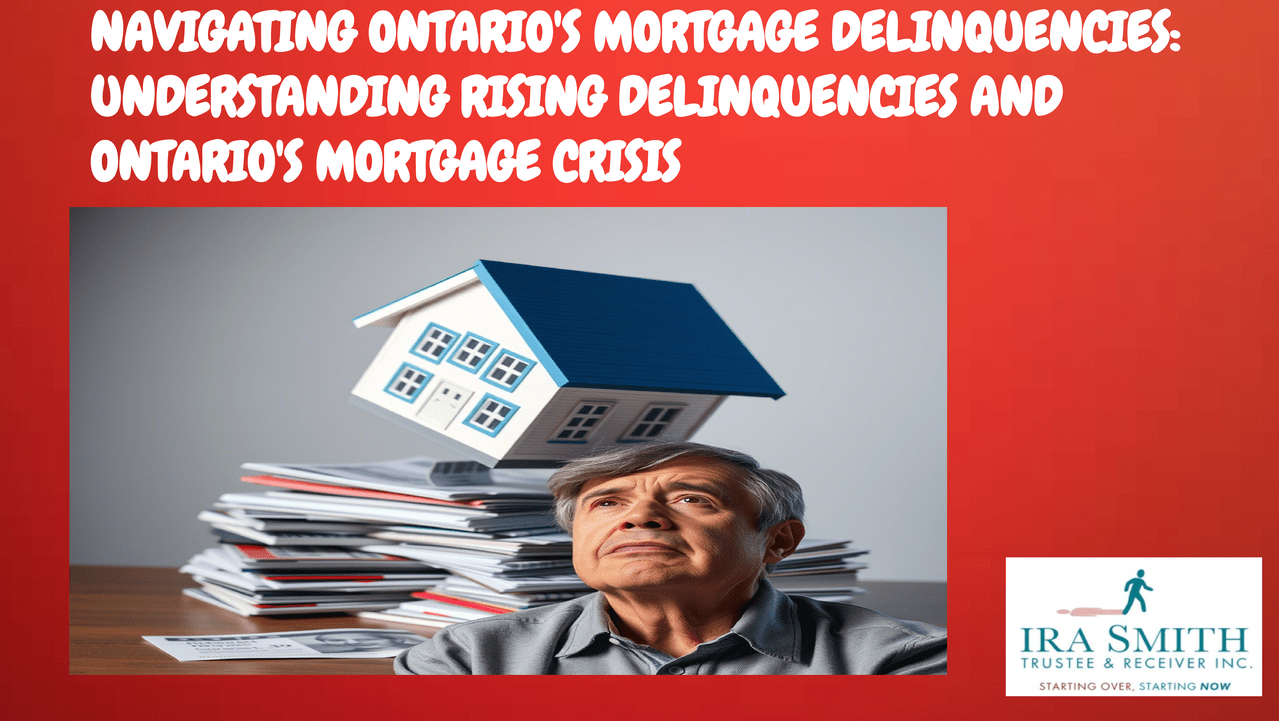

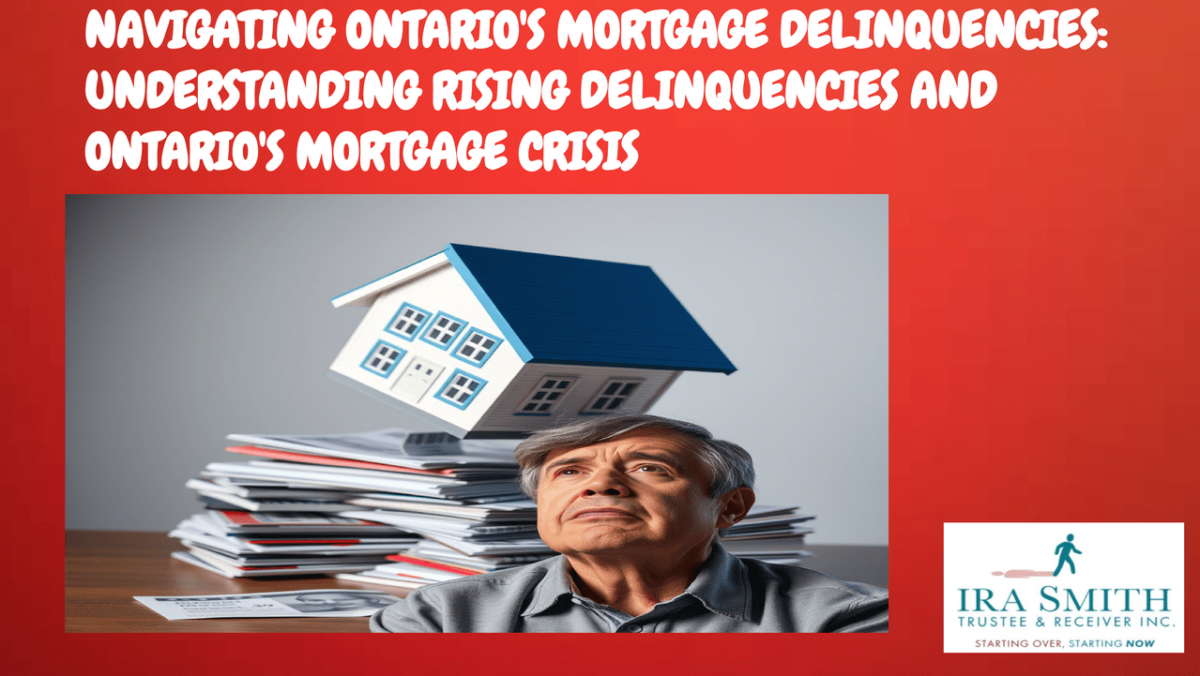
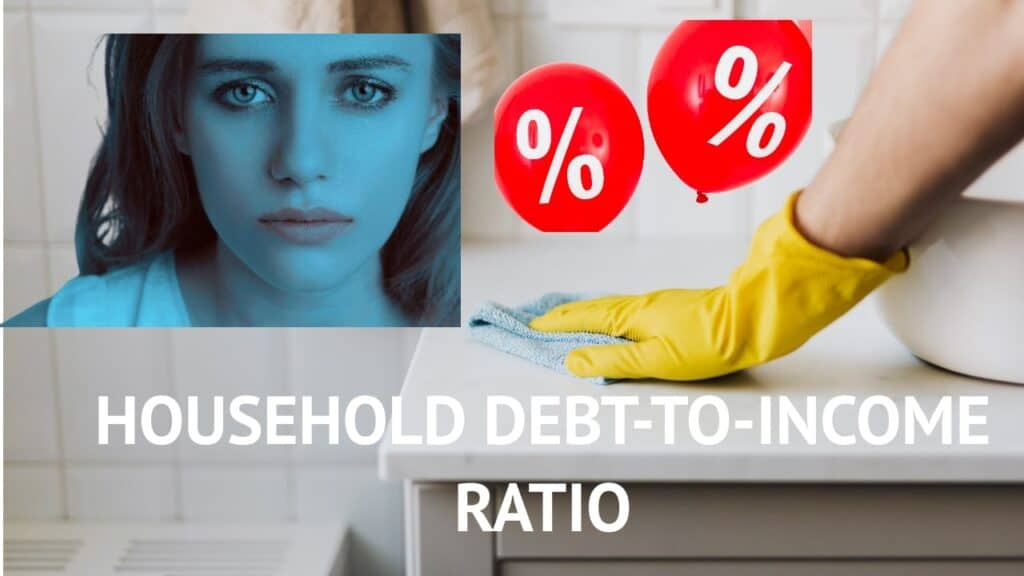
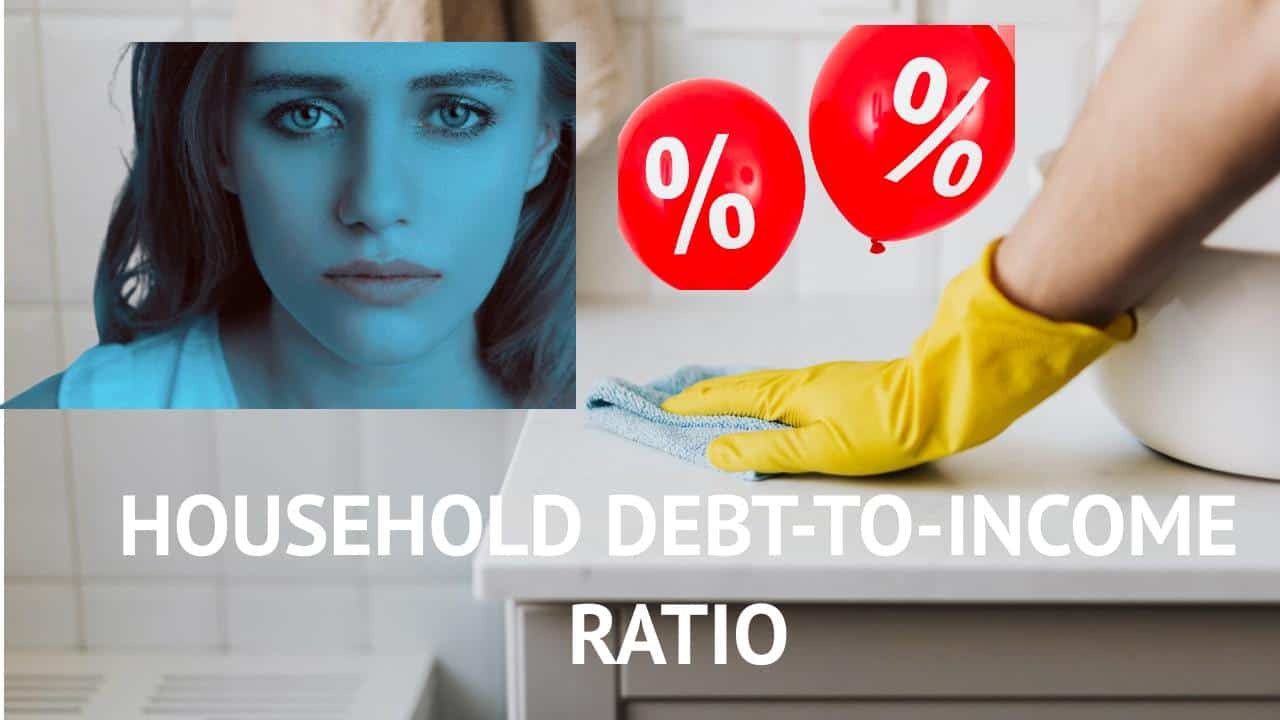


 Subprime lender: Introduction
Subprime lender: Introduction
